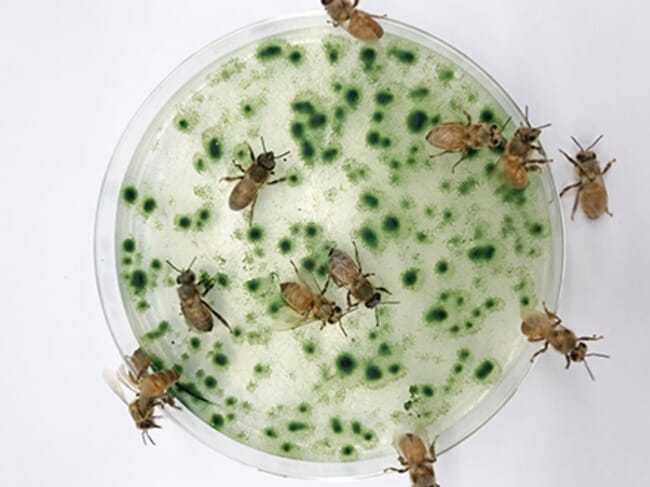ARS scientists with the ARS Honey Bee Breeding, Genetics and Physiology Research Laboratory in Baton Rouge, Louisiana have discovered an option for honey bee nutrition that isn't pollen or nectar: microalgae.

According to ARS researchers Vincent Ricigliano and Michael Simone-Finstrom, different species of microalgae possess nutritional profiles that parallel that of pollen, making the algae an ideal substitute. This is an especially important finding for commercial beekeepers, who rely heavily on pollen replacements to feed their bees on a large scale.
“Although there are currently several artificial pollen diets available, they don’t always contain adequate levels of essential macronutrients (such as lipids and proteins), micronutrients (vitamins and minerals), and antioxidants,” explained Ricigliano.
“These artificial diets try to incorporate a variety of ingredients like soy, corn gluten, yeast, egg, or milk protein, but they often fail to provide the nutrition needed by honey bees to thrive. On the other hand, microalgae are extremely rich in helpful compounds like amino acids, which are crucial for protein synthesis, immune function and overall colony growth.”
In their research, Ricigliano and Simone-Finstrom concluded that bees that consumed microalgae diets grew to larger sizes, had more healthy bacteria in their guts because of the algae’s prebiotic qualities, and were generally more vigorous than honey bees that consumed other pollen alternatives.
Ricigliano believes that there are many species of microalgae that have the potential to improve honey bee health in different climates and seasons.
Microalgae are easy to grow on a large scale, requiring just sunlight, nutrients and shallow bodies of water to produce highly nutritious food for bees. Furthermore, microalgae are even capable of thriving in places where other crops cannot be grown, said Ricigliano. Its ecological viability, affordability, nutritional benefits and ability to act as a biofertiliser and biofuel make it a very promising candidate for further research.




